The Checker Maven
The World's Most Widely Read Checkers and Draughts Publication
Bob Newell, Editor-in-Chief
Published each Saturday morning in Honolulu, Hawai`i
Contests in Progress:
The Cold War Revisited

Marvin J. Mavin, captain of the Detroit Doublejumpers in the National Checker League, was not happy.
It all started out when the company for which Marvin did promotional ads, Belcher's, got wind of his ongoing rivalry with Russian emigre Dmitri Tovarischky, a top player from the days of the former Soviet Union. Belcher's thought that a highly-publicized "grudge match" would aid sales and brand recognition. Billed as "The Return of the Cold War" (even though Marvin was only about 10 years old when the Cold War ended), the match was set for an early spring evening in the Milwaukee Checkerdrome; and Marvin had little choice but to follow the wishes of his sponsor, even though his distaste for Dmitri was all too obvious.
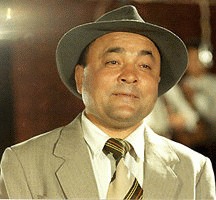
Dmitri
To make it worse, Marvin's girlfriend, Priscilla K. Snelson, was to be in attendance, and Marvin knew that under her watchful eye he would have not a chance in the world of having a pre-game beer. Marvin received a stern lecture, reminding him of a previous loss to Dmitri which Priscilla blamed squarely (and very likely correctly) on over-indulgence.
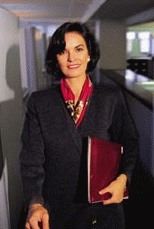
Priscilla
And so, here he was, sitting at the checkerboard in the center of the enormous, fan-packed Checkerdrome, facing Dmitri once again, and not having had any beer for almost 48 hours. Huge American and Soviet flags flew from the ceiling of the Drome, as Belcher's went all-out to set the mood of conflict and rivalry.

Dmitri, for one, had no problem with such a theme, even though he was an emigre. "American Checkers Boy will lose again to superior Russian skills," he crowed loudly. "Checkers Boy is no match for champion like Dmitri."
Marvin seethed inwardly but did not respond, only mumbling under his breath, "Yeah, you'll see what Checkers Boy can do, you old Commie..." But to make things even worse, Marvin had been given the tough end of a very difficult opening ballot. Even though Marvin received draw odds, meaning that if he could but draw the game the match was his, he knew he had a very hard evening in front of him.
At that moment the referee blew his whistle, starting the game clocks, and the match was underway.
12-16 23-19 16x23 27x18 11-16 26-23 16-20 32-27 8-11 30-26 4-8 18-14 9x18 23x14 10x17 21x14 11-15 22-17 8-11 25-21 6-9 26-23 9x18 23x14 11-16 29-25 2-6 17-13 16-19 31-26 6-9 13x6 1x17 21x14 7-10 14x7 3x10 25-21 10-14
Dmitri was gloating and not trying in the slightest to hide it. "Game is over for Checkers Boy," he said. "Checkers Boy has only bad move and loses to Dmitri. Of course, Dmitri is not surprised because Checkers Boy is just inferior American amateur."
Now, there are limits. Marvin expected Dmitri's taunts, but being called an amateur was a bit too much. As a top professional Marvin felt he was owed at least a certain amount of respect.
He was about to lash out angrily and call Dmitri all sorts of names, when Priscilla, sitting in the front row, caught Marvin's eye and simply wiggled her left index finger. That was all it took to silence Marvin, who knew what kind of chewing out he would get later if he failed to heed the warning. Instead, he went back to mumbling. If you listened carefully, you might have heard words such as "old goat," "blowhard," and "beer"; but Marvin realized that the game was at a critical point and knew that he had better come up with something right now, right away.
The position that was on the board is shown below.
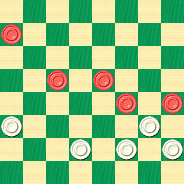
WHITE
White to Play and Draw
W:W28,27,26,24,21:B20,19,15,14,5.
Can you give Dmitri his comeuppance and find a move that gives White a draw? Or is all lost and Black will be the winner? Keep your cool, forget about mumbling, and work out the position before clicking on Read More to see how things turned out.![]()
Atomic Marvin

Marvin J. Mavin
Captain, Detroit Doublejumpers
Marvin J. Mavin, checker star and captain of the major league checker team, the Detroit Doublejumpers, had been in Santa Fe, New Mexico, doing training work with the local semi-pro team, the Santa Fe Salsa. As an exciting conclusion to his visit to the Land of Enchantment, Marvin was invited to come up to Atomic City to take on its supercomputer, nicknamed "Road Rager," which ran a top-level checker program with the erudite name of "Plutonium Bomber Instantiation," or simply "PBI." It was rumored, however, that Marvin was at least as interested in trying out the local microbrews, especially "Atomic Ale," as he was in playing checkers.

On the Road to Atomic City, New Mexico
There was little time for diversions, however; Marvin finished up his training work in Santa Fe around noon on his last day there, and was due to begin his match with PBI just two hours later, at the "Nick the Geek" supercomputer center at the Atomic City Laboratory in Atomic City. Without further ado, Marvin drove up the mountain roads to his destination and was soon badged in at the supercomputer center. The auditorium was completely full as Marvin made his entrance to enthusiastic applause.

Everyone knew that this was something of an historical event. PBI was known to be one of the world's top computer programs (although there was some debate as to which one was really best). It would be playing against one of the top major league checker players. How would it all turn out? PBI's programmers were hoping for the best for their creation, but it seemed that the audience had much sympathy for Marvin.
Marvin sat in front of the Black pieces, ready to take on the silicon giant. "I hear that Atomic Ale is a real blast," Marvin said to one of the PBI programmers, chuckling at his cleverness. The programmer, seated on the White side with a computer console to his left, seemed to wince at Marvin's trite pun and muttered something under his breath to the effect that he thought Marvin was here to play checkers, not drink beer.
But just a moment later, the contest began.
Black: Marvin J. Mavin
White: Plutonium Bomber Instantiation
| 1. | 9-13 | 21-17 |
| 2. | 5-9 | 25-21 |
| 3. | 11-15 | 23-18 |
| 4. | 1-5 | 18x11 |
| 5. | 8x15 | 30-25 |
| 6. | 3-8 | 24-19 |
| 7. | 15x24 | 28x19 |
| 8. | 7-11 | 26-23 |
| 9. | 9-14 |
Perhaps the best move here, but 11-16 or even 11-15 should also retain equality.
| 9. | ... | 22-18 |
| 10. | 13x22 | 18x9 |
| 11. | 6x13 | 25x18 |
| 12. | 11-15 | 18x11 |
| 13. | 8x24 | 27x20 |
| 14. | 10-15 | 31-26 |
| 15. | 4-8 | 20-16 |
| 16. | 12x19 | 23x16 |
| 17. | 8-11 | 16x7 |
| 18. | 2x11 | 26-22 |
| 19. | 11-16 | 21-17 |
| 20. | 5-9 | 32-27 |
Marvin was looking pretty happy with himself. Up to this point the game had been very well played by both sides with no mistakes being made. He concentrated on the position for a while and then said, "Bomb Boy .... I think you've bombed out this time!" He made the following move.
| 21. | 16-19 |
Marvin rocked back in his chair, folded his arms over his chest, and grinned. "What'll you do about that, Bomb Boy?" he asked. "You might be a real smart computer, but you ain't a match for Marvin J. Mavin! I think it's just about time to try out the local brew, because this game is sure over soon!"
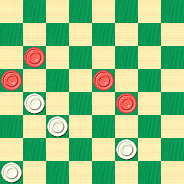
WHITE
White to Play, What Result?
W:W29,27,22,17:B19,15,13,9.
Has Marvin indeed defeated one of the world's mightiest computers? Has he truly earned his beer today? Analyze the position and decide whether White should play on, or simply resign. When you have your answer, click on Read More for the high-yield solution.![]()
Fourth of July Picnic
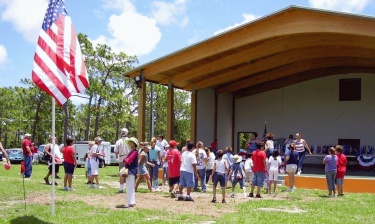
Tommy always looked forward to going to the Fourth of July Picnic with his family. There would be hot dogs, hamburgers, watermelon, ice cream cones, and a host of summer treats. There was the three-legged race, the pie-eating contest, and more fun than could ever be imagined, topped off with an exciting display of fireworks. Tommy's home town in Florida really knew how to celebrate America's birthday.
But this year was even more special. Tommy was going to play in the adult section of the Fourth of July checker tournament! Normally, he would play in the elementary school section, but this year he had managed to get permission to go straight to the top and play with the grownups.

Now, Tommy had been studying checkers every Saturday morning with Uncle Ben (see our Uncle Ben's Porch series of columns). Uncle Ben wasn't really his uncle, but everyone called him that; and under his mentoring, Tommy had come a long way with his checker skills.
Uncle Ben was at the picnic, of course, but as a full-fledged professional wasn't allowed to enter the tournament. Tommy wanted to make him proud and was determined to play well. But playing against experienced adult checkerists was no easy assignment.
The tournament was "single life" elimination. If you lost your round, or if your game was a draw in two rounds, you were out of the competition.
The first round was about to begin. Tommy was paired with a very tough opponent, 47-year old insurance agent Bob Fernastus, one of the top adult amateurs in the area. Bob was captain of the county champion recreational checker team, the Mutual Farm Draughts Oxen.

Bob Fernastus
They met at their assigned board. "Pleased to meet you, Mr. Fernastus," said Tommy politely as they shook hands. "Same here, young man," said Bob in return; was he perhaps being just a bit condescending to his much younger opponent? But just at that moment, the tournament director gave the call, "Start your clocks!" and the tournament was underway.
Tommy had White and the game unfolded as follows.
| Black: | Bob Fernastus | |
| White: | Tommy | |
| 1. | 12-16 | 22-18 |
| 2. | 8-12 | 25-22 |
| 3. | 16-20 | 24-19 |
| 4. | 4-8 | 22-17 |
| 5. | 9-13 | 30-25 |
| 6. | 13x22 | 26x17 |
| 7. | 10-14 | 17x10 |
| 8. | 7x14 | 18x9 |
| 9. | 5x14 | 25-22 |
| 10. | 6-10 | 22-18 |
| 11. | 1-5 | 18x9 |
| 12. | 5x14 | 29-25 |
| 13. | 11-15 | 25-22 |
| 14. | 15x24 | 28x19 |
| 15. | 3-7 | 32-28 |
| 16. | 2-6 (see diagram) | 28-24 |
| 17. | 8-11 | 22-18 |
| 18. | 6-9 | 18-15 |
| 19. | 11x18 | 21-17 |
| 20. | 14x21 | 23x5 |
| 21. | 7-11 | 27-23 |
| 22. | 20x27 | 31x24 |
| 23. | 21-25 | 5-1 |
| 24. | 11-15 | 1-6 |
Draw Agreed.
"Wow," said Bob, you really had me going there! Great game, Tommy, but do you realize you missed a win at move 16?"
Tommy, pleased to get a draw against a highly skilled adult player, looked puzzled. "A win, Mr. Fernastus? Really?"
"Yes, Tommy, you could have won the game! Do you want me to show you?"
"Yes, sir, if you would ... I had no idea ...."
"Well, then Tommy," Bob continued, "Here it is."
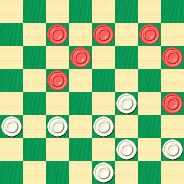
WHITE
White to Play and Win
W:W31,28,27,23,22,21,19:B20,14,12,10,8,7,6.
Could you have found the win where Tommy didn't? We'll warn you, it's subtle and probably well beyond the skills of even a very talented grade schooler. Give it a try and click on Read More when you're ready to see the solution and complete game notes.![]()
Marvin Visits Manchester

It was the All-Star break during this year's National Checker League season, and as part of the week-long festivities, Marvin J. Mavin, checker star and team captain of the Detroit Doublejumpers, was doing a promotional tour in Great Britain.

Professional Checker Star Marvin J. Mavin
Certainly it would come as no surprise to know that one of the stops on Marvin's tour was the city of Manchester, truly one of the checker--- or should we say draughts--- capitols of England. Marvin had undertaken to play a simultaneous exhibition against the members of the British Amateur Championship team, the Chorley Checker Chaps. A fivesome made up of star draughtmen, their roster was impressive: Matthew Eek; the eminent mathematician and team captain Dr. John Algeeber; Donald Oligarch; Melvyn Emerald; and Eddie O'Gollie.

The Championship Team, The Chorley Checker Chaps
The match was taking place at that noted local enterprise, the Multicorn, where it was said that the beer and ale were of the highest quality and the atmosphere most suited for a serious match of draughts.

The Multicorn, Site of the Match
When told of the arrangements, we understand that Marvin approved wholeheartedly, even though his coach had warned him to maintain a positive image and keep in mind the public relations purpose of the tour: in other words, keep away from the beer, stay sober, and play winning checkers.
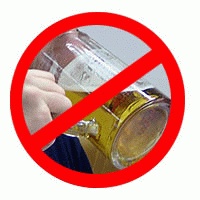
There were a couple of problems with that directive, however. First, Marvin, being more than a bit of an iconoclast, always had shall we say a bit of a problem in following the directions of higher authorities. Second, as we all unfortunately know, Marvin was rather partial to a good pint of beer, and was known to partake at inappropriate moments, and in fact at any moment possible. (Recall our earlier Checker Maven story in which Marvin lost a game to his arch-rival, Dmitri Tovarischky, after having enjoyed Octoberfest beverages a little too freely.)
Marvin was in full form for today's exhibition, and he would need to be at his best; the Checker Chaps were no easy targets, being the best amateur players in England. The playing room was ready; the Checker Chaps were seated at their boards, and the room was filled to overflowing with enthusastic fans.
The match was about to begin when to everyone's surprise (or perhaps to no one's), Marvin suddenly called for "a pint of Base Ale all around."
The Checker Chaps did their best to mutter polite refusals but not a few of the fans, and Marvin himself, soon had in hand a frothy mug of ale. Play began, and it quickly became evident that the Checker Chaps would provide Marvin with stiff competition.
Marvin quickly won his game on Board 4 after taking advantage of a positional error. Board 5 ran into a quick draw, as did Board 3. On Board 2, Marvin lost a piece in a tricky exchange and graciously (at least by Marvin's standards) resigned the game, quickly calling for another pint of Base Ale to assuage his disappointment with the loss.
The game on Board 1 with Dr. Algeeber would decide the match. It had played out thus far as follows:
Black: Marvin J. Mavin
White: Dr. John Algeeber
| 1. | 9-14 | 24-20 |
| 2. | 5-9 | 22-18 |
| 3. | 11-15 | 18x11 |
| 4. | 8x15 | 25-22 |
| 5. | 7-11 | 22-17 |
| 6. | 4-8 | 17-13 |
| 7. | 2-7 | 29-25 |
| 8. | 1-5---diagram |
The situation was tense. Dr. Algeeber wanted to win the game and take the match on behalf of his team and the home town fans. Marvin, of course, as a star professional player, had a reputation to uphold. But Dr. Algeeber was an expert in his own right and an opponent not to be taken lightly.
Of course, one had to ask if Marvin should really have called for that third pint of Base Ale, "to clarify his thinking" as he told the barmaid.

Dr. Algeeber had again declined, this time noting in a somewhat pointed manner that "draughts of ale and draughts over the board really don't mix all that well, you know." The British team captain was now on move, and realized that he had chances to perhaps pull through with a win. The board position was as follows.
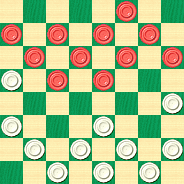
WHITE
White to Play and Win
W:W32,31,30,28,27,26,25,23,21,20,13:B15,14,12,11,10,9,8,7,6,5,3.
Marvin, as usual, was fidgeting in his chair, taking frequent sips from his mug. Though he found this all more than a bit annoying and distracting, Dr. Algeeber, being the gentleman that he was, refrained from complaining. Finally, though, he allowed himself a bit of a smile as he made his move.
Would you have been able to win this position against someone with Marvin's finely honed professional skills? Would you have been able to keep cool despite Marvin's constant fidgeting, muttering, and slurping of ale, or would you have been tempted to dump a water pitcher over his head?
Well, we certainly wouldn't recommend something so impolitic as the latter, but we do recommend that you try to find the winning move, and then click on Read More for the conclusion of the story and the solution to our problem.![]()
Block Construction

This month, instead of the usual speed problem or stroke problem which is our traditional month opener, we're bringing you an example of a rarer species: the block problem. And this is not just any block problem; it's a block construction problem.
Having nothing at all to do with the building trades, a block construction problem challenges you to reconstruct the moves leading up to a block position. Let's take a closer look: our target position is shown below.
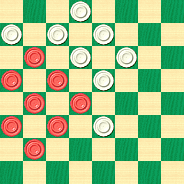
BLACK
Black to Play; White has Won
B:W31,28,27,26,23,22,18,10:B24,20,19,16,15,12,11,8.
In this position, Black is to move and the game is lost. Black is completely blocked and has no move. Your challenge is to come up with a full game, composed only of legal moves, that will lead to the block position shown. This is much more difficult than you might think, and could take an expert player an hour or more to do.
Are you up to the challenge, or are your mental processes blocked? Show your prowess as a builder by solving today's problem, then click on Read More to see how our position arose in an actual published game.![]()
The ACF Nationals
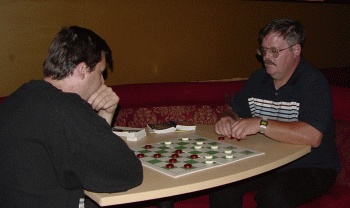
Checker Action at the 2007 Nationals
Virtually every week The Checker Maven brings you a puzzle or a problem to solve; something to enjoy and learn from, and which demonstrates the endless depths of our game of checkers. But this week is a little different. Today instead we present for your pleasure two excellent games from last year's U.S. National tournament, which took place in July 2007 in the fabled city of Las Vegas. We're also shamelessly pitching the 2008 National tournament, in the hopes that you will attend if you can or donate a little something if you can't.
Our spotlighted games from the 2007 tournament were sent along by Colorado Springs checker expert Bob Murr, whom we're proud to say has been a reader and supporter of The Checker Maven since the very beginning. In the 2007 tournament, Bob played a pair of games against the Irish expert Tommy Canning, famed for his skill as a correspondence player, but equally formidable in an over-the-board contest. The games below were annotated by Bob. We hope you enjoy them.

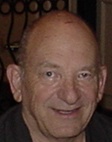
2007 Nationals Contestants Tommy Canning and Bob Murr
[Event "US National 2007"]
[Date "2007-07-25"]
[Black "Bob"]
[White "Tommy C"]
[Result "1/2-1/2"]
| 1. | 11-15 | 23-19 |
| 2. | 8-11 | 22-17 |
| 3. | 9-14 | 17-13 |
| 4. | 4-8 | 25-22 |
| 5. | 15-18 | 22x15 |
| 6. | 11x18 | 29-25 |
| 7. | 7-11---A | 26-23 |
| 8. | 10-15---B | 19x10 |
| 9. | 6x15 | 23-19---C |
| 10. | 14-17---D | 21x14 |
| 11. | 18-23 | 19x10 |
| 12. | 2-6 | 27x18 |
| 13. | 6x29 | 14-10 |
| 14. | 12-16 | 24-20---E |
| 15. | 16-19 | 32-27 |
| 16. | 11-15 | 20-16 |
| 17. | 8-12 | 16-11 |
| 18. | 12-16 | 11-7 |
| 19. | 16-20 | 27-24---F |
| 20. | 20x27 | 31x24 |
| 21. | 19-23 | 7-2 |
| 22. | 23-27 | 10-7 |
| 23. | 3x10 | 2-7 |
| 24. | 10-14 | 7-10 |
| 25. | 15-19 | 24x15 |
| 26. | 27-31 | 10x17 |
| 27. | 31-26 | 30x23 |
| 28. | 5-9 | 13x6 |
| 29. | 1x26---G | Drawn. |
A---This move has a bad record strongly favoring White; the 10-15 exchange is favored here, followed by either 26-23 or the 24-19 exchange to an even game.
B---11-15 seems better.
C---30-26 is the power move here followed by 2-6, 26-22, 3-7, then the 24-19 exchange appears to win.
D---During the game, I thought this would equalize but it offers White a powerful advantage.
E---31-27 is the power move although this also appears to win.
F---This allows Black an even game, 7-2 wins by 19-24, 28-19, 15-24, 2-7, 24-28, 7-11, 28-32, 31-26, etc. WW.
G---Black was very fortunate indeed to escape.
Click here for an animated version of this game.
[Event "US National 2007"]
[Date "2007-07-25"]
[Black "Tommy C"]
[White "Bob"]
[Result "0-1"]
| 1. | 11-15 | 22-18 | |
| 2. | 15x22 | 25x18 | |
| 3. | 8-11 | 29-25 | |
| 4. | 4-8 | 24-20 | |
| 5. | 10-15 | 26-22---A | |
| 6. | 9-14---B | 18x9 | |
| 7. | 5x14 | 22-17 | |
| 8. | 6-10---C | 25-22---D | |
| 9. | 2-6---E | 23-18 | |
| 10. | 14x23 | 27x18 | |
| 11. | 15-19 | 17-13 | |
| 12. | 1-5---F | 22-17 | |
| 13. | 10-15 | 18-14 | |
| 14. | 7-10---G | 14x | |
| 15. | 3x10 | 17-1 | |
| 16. | 10x17 | 21x14 | |
| 17. | 15-18 | 31-26 | |
| 18. | 12-16 | 26-23 | |
| 19. | 18x27 | 32x23 | |
| 20. | 19x26 | 30x23 | |
| 21. | 16-19 | 23x7 | |
| 22. | 6-10 | 7-3 | White Wins. |
A---25-22 is more common as in the trunk line of Duffy's Single Corner (DSC).
B---As taken in Duffy's variation 33.
C---New to me; Duffy recommends either 7-10 or 15-19 as in note C of variation 33 of DSC.
D---Or 15-19, even game.
E---15-19 looks easier.
F---19-23 and 12-16 also fail the test 19-23, 21-17, 12-16, 18-14, 1-5, 31-27 etc.
G---Or 6-10, 13-9, 12-16, 9-6 etc. Black doesn't have many options.
Click here for an animated version of this game.
Did you like these games? We hope so, and we hope you'll consider attending the 2008 Nationals, to be held at the Vegas Club in downtown Las Vegas. This year an incredible checker triple-header will take place!
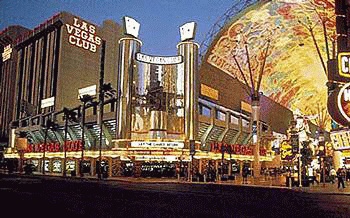
The Vegas Club, Downtown Las Vegas
First, there is the "Arthur Niederhoffer" National Youth Tournament, running from July 19th-20th , 2008 This event is for youth 21 and under. Full information can be found here:
http://usacheckers.com/tournamentannouncements.php#186.
Then, the "Gene Lindsay" 3-move US National will be held from July 21st-25th. This will be a three-move restriction event using the 156-opening deck and played in a Swiss system format. Additional information can be found here:
http://usacheckers.com/tournamentannouncements.php#184.
Finally, the District 9 Open (Western States Championship) will be held from July 27th-28th with a playoff on the 29th if necessary. Further details can be found here:
http://usacheckers.com/tournamentannouncements.php#185.
The Vegas club is offering checker players a very inexpensive room rate at $55 plus tax for Friday and Saturday nights, and only $29 plus tax for Sunday through Thursday nights. Players will also need to add an additional $15 per day of play to help with the costs of the playing room.
Legendary organizer Gerry Lopez is accepting donations for the Nationals prize fund. A contribution of $10 or more will bring a copy of 50 selected Masters' Division games direct to your mailbox. Please be generous and send your donation to:
Gerry Lopez, ACF Representative
41858 Corte Selva, Temecula CA 92591.
You will also receive credit in the ACF bulletin and the Missouri Newsletter.
Imagine it --- ten days of top-quality checkers in fabulous Las Vegas. It's a checker player's dream!![]()
The 11-Man Ballot Game

Most of us--- we're talking about the casual, average checkerist here--- are very happy with "Go As You Please" (GAYP) checker play, in which the choice of opening moves is completely at our own discretion. We find more than enough challenge and entertainment in this most basic form of our game.
But, as we're sure most of you know, at the highest levels of play, GAYP tends to be drawish, and games tend to repeat, especially when the players are unwilling to take risks with a championship or prize at stake. That's why "2-move restriction" and later on, "3-move restriction" checker play came into being. In these forms of the game, the first two or three moves are chosen at random, by "ballot," and a pair of games is played from the chosen ballot, each player trying his luck at each side of the opening. The idea is to force the game into different lines of play and avoid drawish repetition.
Of course, the reason that 3-move restriction arose is that 2-move restriction play was highly analyzed and drawishness crept into even this form of the game. 3-move restriction, which is today the common mode of play at major tournaments, does somewhat better, but it too has been analyzed a great deal.
There is another form of play, invented many years ago by champion Newell W. Banks, which provides literally thousands of possible opening combinations, far too many to easily analyze, and certainly too many to memorize. That form of play is called "11-man ballot." In this game, a ballot is chosen which eliminates at random one man from each side (hence the 11-man idea) and then chooses the opening move for each side, just as in 2-move restriction. There are some limitations and additional rules, but we're sure you get the idea.
11-man ballot hasn't been very widely played. There have been a few 11-man ballot matches and tournaments, but not very many. Only recently have we seen revived interest in this form of play, with 11-man ballot games and tournaments taking place at the GoldToken internet site, and a recent live contest held in North Carolina and won by Tim Laverty. A match championship is scheduled for summer 2008 between Tim and reigning 3-move world champion Alex Moiseyev.
11-man ballot makes for exciting and often unpredictable play, as unusual starting positions require the players to exercise their over-the-board skills to a very high degree. It has much to recommend it and we'll guess that 11-man ballot has a renewed and bright future.
Today, though, let's go back in time to the classic 11-man ballot title match between champions Asa Long and Newell Banks. Here's one of the better games from that historical match, which took place many years ago.
| Black: Asa Long |
| White: Newell W. Banks |
| Ballot pieces off squares 6 and 24 |
| Two Move Ballot---9-13, 23-19 |
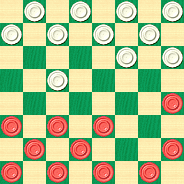
BLACK
Starting Position; Black to Play
| 9-13 | 23-19---a | 11-15 | 28-24 |
| 8-11 | 26-23 | 5-9 | 22-18 |
| 15-22 | 25-18 | 11-15---b | 18-11 |
| 7-16 | 29-25 | 9-14 | 25-22 |
| 1-5 | 22-18 | 16-20 | 18-9 |
| 5-14 | 23-18---c | 14-23 | 27-18 |
| 20-27 | 31-24 | 3-7 | 18-14 |
| 10-17 | 21-14 | 4-8 | 14-9 |
| 8-11 | 9-5 | 13-17---d | 5-1 |
| 7-10 | 24-20 | 11-15 | 32-28 |
| 15-24 | 28-19 | 17-22 | 1-5 |
| 2-7 |
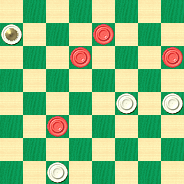
WHITE
White to Play and Win
W:W30,20,19,K5:B22,12,10,7.
Original notes are by Newell W. Banks.
a---Opens a beautiful position with the advantage to White, yet a sound defense seems possible.
b---Banks played 1-5 here against Long and should have drawn without much trouble.
c---Forms a magnificent ending which abounds with hidden possibilities.
d---7-10 looks best here and escapes with a narrow draw, thus 24-20, 11-15, 32-28, 15-24, 28-19, 20-16, 10-14, 6-1, 14-18, 1-6, 18-23, and Black just escapes.
Can you win the position shown above? Vote for your choice of move and then elect Read More to see the solution, the rest of the game, and additional explanatory notes.![]()
Draughts on a Winter's Eve
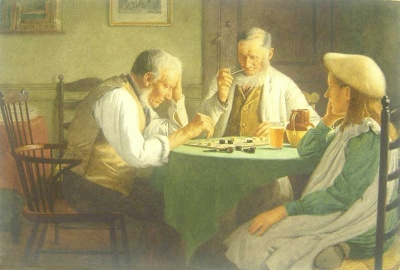
Sometimes, on a cold winter's eve when the snow lay in heaps upon the ground, my neighbor would visit and we would sit at the table and play not a few games of draughts. My daughter would bring us something warm to drink, or even, at times, a pitcher of ale; my neighbor always would remark about how fine was my ale, thinking, I wager, to be urged on to a second glass. We would play until the fire burned low on some of those nights, and daughter would sit and watch all the while. How hard it was the next morning to rise early for work, and how equally difficult it must have been for her to rise for school! Still, we enjoyed our games, and she seemed to enjoy sitting by every bit as much.
So it was one evening that, with the hour getting late and the room starting to chill, we decided to contest one final game. And what a game it turned out to be, one to remember all through the years! My neighbor and I, being very closely matched as to skill and temperment, had pretty evenly divided the score thus far, and of course we were both rather hoping to win this last match and carry the honors of the evening. I had the Black men, he the White, and the game proceeded in this manner.
1. 9-14 22-18
2. 5-9 24-19
3. 11-15 18x11
4. 8x24 28x19
5. 4-8 25-22
6. 9-13 29-25
7. 8-11 22-18
8. 14-17 21x14
9. 10x17 18-15
10. 11x18 23x14
11. 7-11 25-22
12. 11-16 14-10
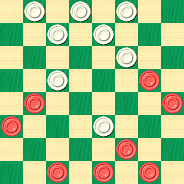
BLACK
Black to Play and Draw
B:W32,31,30,27,26,22,19,10:B17,16,13,12,6,3,2,1.
"Alas," I cried, "I fear all is lost. Good neighbor, I believe the evening is yours." Although I did always essay to win in a gracious manner and equally so to lose in a sportsmanlike fashion, still, I am sure, there was disappointment in my voice.
But suddenly, to my great surprise--- and, I am certain, my neighbor's as well--- my daughter spoke out and said, "Oh, father, I think not; surely the game is drawn!"
"Daughter," said I, "there is no shame in my loss. Pray do not detract from the skill shown by our good neighbor in his command of the White pieces in this excellently played game."
"Oh, no, father, that I would not do," she replied, "but still, though well played by you and our neighbor alike, even so, the game is most surely drawn."
At this moment our neighbor smiled, put down his pipe, and said, "Aye, then, good father, let your spirited young lass contest the finish in your stead!"
"Oh, father, may I?" asked she, and I knew she was not to be denied; whereupon, I moved my chair to the side, she moved her own round to the Black side of the board, and the play went on.
For the solution, and the rest of our story, just click on Read More.![]()
An Oktoberfest Contest
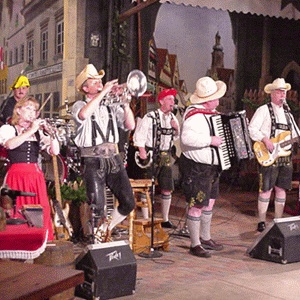
It was about five in the afternoon on a fine Sunday in October, and Marvin J. Mavin was sitting in the Biergarten on the Detroit Oktoberfest grounds. Marvin, as you probably know by now, is team captain of the Detroit Doublejumpers, a leading team in the National Checker League. The Doublejumpers were off today, and Marvin had just finished playing a simultaneous exhibition in the Oktoberfest's Main Halle. Marvin took on no less than 48 other players, all at once, in a benefit for disadvantaged city youth, a cause that Marvin often proudly volunteered to support. Marvin, in true championship form, won 46 games, drew two, and lost none at all.
The problem was, Marvin decided that such a performance was worthy of a beer. Or maybe, beers. So after the exhibition, he had gone right to the Biergarten, and for the past hour had been enjoying the atmosphere perhaps a little too much, and, well, things like that don't usually turn out for the best...

Marvin, in a bit of a reverie, suddenly sensed someone standing in front of him, talking rather loudly. Blinking his eyes and looking up, he realized it was none other than Dmitri Tovarischky!

Now, if you recall our earlier story (found here), a little while back Marvin had gone with his girlfriend Priscilla (who was at the moment in England on business) to a champagne party, and had played to a rather tense draw in an impromptu challenge game with Russian champion Dmitri. Marvin's less than star-like behavior had led to quite a row with Priscilla, and Marvin ended up taking the bus home instead of riding in Priscilla's Mercedes.
"Checkers Boy! What you doing here!" Dmitri exclaimed. "Should be home practicing!" Dmitri accompanied the last statement with a bit of a snort.
Marvin looked up, and it was obvious that he wasn't pleased to see Dmitri, let alone listen to his remarks. "Hey Russki, I played an exhibition and won 46 out a 48. You couldn't a done that! You ain't good enough!"
"Dmitri would be winning all games, Checkers Boy! Dmitri does not drink bad American beer and get funny in head and play poor game of checkers!"
"Hey, I didn't ..." Marvin started, but Dmitri immediately interrupted him.
"You and I, we play game now, da?" And before Marvin could even reply, Dmitri had opened up a little briefcase, took out a folding board and a set of checker pieces, and had started to set up for a game. "Checkers Boy will take Black pieces," Dmitri stated when the board was ready for play.
"No dude, they're Red pieces. Red, get it, like you!" Marvin chuckled at this remark but Dmitri glowered at the impolite comment. Not receiving a reply, Marvin began the game, and it played out as follows.
Black: Marvin
White: Dmitri
1. 11-16 23-18
2. 16-20 24-19
3. 9-14 18x9
4. 5x14 27-23
"Kind of a bum move, Russki!" exclaimed Marvin.
5. 8-11 22-18
6. 6-9
"Is now your bad moving," Dmitri said.
"Will ya keep quiet and play!" Marvin, replied with some annoyance.
6. ... 25-22
7. 2-6
"American beer drinker is cooked goose now!" Dmitri said, with glee.
7. ... 22-17
8. 4-8 30-25
"Ha, ya big loser, that move ain't so hot," Marvin threw across the table.
9. 11-16
"OK, Checkers Boy, Dmitri maybe make one mistake, but now you losing game for sure," Dmitri shot back.
10. ... 25-22
10. 20-24 32-27
11. 16-20 29-25
12. 8-11 17-13
13. 11-16
"You playing bad checkers when drinking American beer!" Dmitri said, repeating his earlier remark.
13. ... 22-17
14. 7-11 25-22
15. 3-8
"Now win is here," said Dmitri. "Game is over for Checkers Boy!"
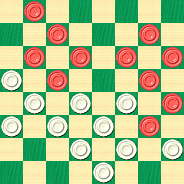
WHITE
White to Play and Win
W:W31,28,27,26,23,22,21,19,18,17,13:B24,20,16,14,12,11,10,9,8,6,1.
15. ... 19-15
16. 10x19 17x10
17. 6x15 13x6
18. 1x10 21-17
19. 10-14 17x10
White Wins.
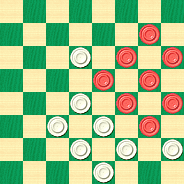
WHITE
White Wins
"I told you, Dmitri is winning all games," Dmitri concluded. "Checkers Boy better take taxi to home and go in his bed and sleep until next day is coming." And in an instant, Dmitri had packed away the checker set and board and was gone.
"Wha...what..." was all Marvin could say, and in the background, he heard one of the small crowd of observers call out, "Yeah, better get 'em a taxi and send 'em home!" and then added, "His coach ain't gonna like it when he shows up for practice with a big headache!"
Can you correct the play at moves 4, 6, 7, 8, 9, 13, and 15? Dmitri did make one large error, but Marvin made many. What would you have played instead? Analyze the game and then click on Read More for complete annotations and the game in PDN format.![]()
Allan Millhone Plays Checkers
To accompany our interview with American Checker Federation President Alan Millhone, we present these two fine games played by Mr. Millhone in the 2006 District 6 Checker Tournament, against no less an opponent than World Champion Alex Moiseyev. The games have been expertly annotated by Dr. Richard Beckwith.


Games from 2006 District 6 Tournament
Game 1
Black: Alan Millhone
White: Alex Moiseyev
10-14 22-18 11-16 26-22---A 8-11---B 22-17---C 16-20---D 17x10 6x22 25x18 9-14---E 18x9 5x14 29-25 7-10 25-22 3-7 30-26 11-15 24-19 15x24 28x19 4-8 22-17 7-11 17-13 11-16 26-22 8-11 22-18---F 1-5 18x9 5x14 13-9 11-15 9-5 15x24 23-19 16x23 27x9 12-16?---G 5-1 10-14 1-6 14-18 6-10 18-22---H 10-15 22-25---I White Wins.
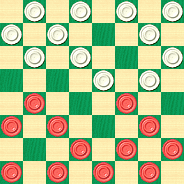
BLACK
Black to play (note D)
B:W32,31,30,29,28,27,25,24,23,21,18,17:B16,14,12,11,9,7,6,5,4,3,2,1.
WHITE
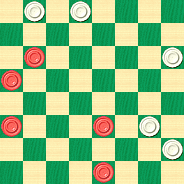
BLACK
Black to Play and Draw (note G)
B:W32,31,21,9,5:B24,20,12,10,2.
A---Also reached from 11-16 23-18 10-14 26-23 same.
B---Natural, but a very weak reply, unless one has a prepared defense. In fact, Solid Checkers gives 8-11 a question mark. The two usual alternatives are 7-10 and 16-20. The 16-20 move permits 22-17 7-10 and the option of a good off-Bristol-Cross variation with 17-13 now, as shown in Basic Checkers Op. # 120 trunk, the line where 24-19 is held back. To keep more options open, 7-10 has been suggested (instead of 16-20 or 8-11), then 22-17 and now black has the option of 16-20 (into the same line just mentioned) or the 16-19 bust.
C---A good move by the world champ, whereas 24-19 allows 16-20 and back into a standard Bristol-Cross.
D---See diagram prior to 16-20. Alan has previously played the published 7-10 here (vs. L. Cowie in 2005 OH Ty.), but I like this 16-20 better! Both BC and SC give only 7-10 25-22 3-7 31-26 9-13 18-9 5-14 23-19 with white powerful.
E---While this will get through to draw, black also has 7-10 as a defense (perhaps new?). Continue with 24-19 (or 29-25 3-7 24-19 11-15) 11-16 and into an old secondary Bristol-Cross defense often used by another Ohio player, Louis Cowie (and occasionally by your annotator as well). This position normally arises from 11-16 23-18 16-20 24-19 10-14 26-23 8-11 22-17 11-16 17x10 6x22 25x18 7-10.
F---13-9 (liked by programs, but not necessarily better) 11-15 32-28 15x24 28x19 1-5 31-26 2-7 22-18 14-17 21x14 10x17 9-6 17-21 6-2 7-10 2-6 10-14 18x9 5x14 26-22 21-25 6-2 (or 6-10 14-18 22x15 25-30 draw) 25-30 2-6 and now pitching the man on 14 is necessary, and then the king can attack the elbow to draw. rcb
G---Sets up a “breeches” problem later. Instead, 10-15 5-1 15-18 31-26 12-16 (now OK with 31-26 played) 1-5 2-7 9-6 16-19 5-9 7-11 (whoops! 18-23 draws this game) 32-27 & 9-14 WW, T. Laverty – R. Jones 1987 Florida Open
H---Now black cannot advance to 23 to set up a trade due to the king advance with 10-15 & 15-19.
I---The scoresheet ended here, but the position will win for white given the three stranded black pieces in front of the double corner, as well as additional white kings “on the way.”
Game 2
Black: Alex Moiseyev
White: Alan Millhone
10-14 22-18 11-16 25-22 16-20 29-25---A 8-11---B 18-15---C 11x18 22x15 4-8---D 26-22---E 7-10 31-26 10x19 24x15 6-10---F 15x6 1x10 22-18---G 8-11 28-24 10-15 25-22 2-7 23-19 14x23 19x10 7x14 26x19 9-13 22-18 14x23 27x18 20x27 32x23 11-16 18-15 16-20 15-11 20-24 23-18 24-27 18-15 27-31 11-7 3x10 15x6 31-27 6-2 5-9 2-6 9-14 19-15 14-18 6-9 18-22 15-10 27-23 21-17 Drawn.
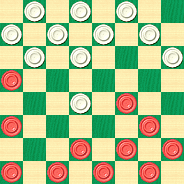
BLACK
Black to Play (note D)
B:W32,31,30,28,27,26,25,24,23,21,15:B20,14,12,9,7,6,5,4,3,2,1.
WHITE

BLACK
Black to play (note F)
B:W32,30,28,27,26,25,23,22,21,15:B20,14,12,9,8,6,5,3,2,1.
A---A natural development, but 24-19 is preferred, or taking the Bristol-Cross a move earlier, as Alex did in Game 1. Historically, 29-25 has thrown the advantage back to black.
B---This position is also reached by either 11-16 22-18 16-20 25-22 8-11 29-25 10-14 or by 12-16 22-18 16-20 25-22 8-12 29-25 10-14.
C---24-19 is known to be “bad” by well-versed players due to the bind, but narrow draws do exist. Continue: 11-16 (4-8 19-15 7-10 27-24 draws) 18-15 4-8 28-24 7-10 15-11* (instead of 22-18 and Ryan’s “Pickle Barrel trap” given in Solid Checkers) 8x15 23-18 14x23 27x11 16x23 26x19 20x27 31x24 10-15 draws, Wyllie-Barker, 1882, from 11-16 24-19 8-11 opening.
D---See diagram prior to 4-8. There are three established options here, with 7-10 (Var. 1) being best for black, and a review of the OCA database reveals the majority of these games have resulted in black wins. The 4-8 played here has historically favored white. The third option is 9-13 (Var. 2), as given in Basic Checkers Opening #116 trunk.
E---Well played by Alan, leaving black to use care to draw. 24-19 instead is wanted, then 7-10 leads to the “bad stuff” for white in Var. 1.
F---See diagram prior to 6-10. Not 14-18? 23x14 9x18 21-17* (instead of 26-23 3-7 23-14 6-10 draw, Gonotsky-Lieber, 1928) 2-7 26-23 6-9 23x14 9x18 30-26 1-6 26-23 12-16 23x14 7-10 14x7 3x19 25-21* 5-9 22-18 9-13 17-14 13-17 18-15 17-22 21-17 22-26 17-13 8-12 27-24 20x27 32x23 26-31 23-18 31-26 14-9 26-23 9x2 23x14 15-10 WW, J. Hanson.
G---Leads to a quiet draw, likely unpublished. (And any quiet draw for an “average” player against a world champ is a good one!) The usual press is with 23-18 14x23 27x18 9-13 18-14 10x17 21x14 2-6 22-18 6-10 14x7 3x10 26-23 8-11 23-19 20-24* 19-16 11x20 28x19 to a draw, Rubin-Hunt 1934 Am. Ty., from 12-16 22-18 16-19 opening.
Var. 1 7-10 24-19---1A 4-8 27-24---1B 20x27 31x24 9-13 (2-7 also strong) 24-20 3-7 25-22 5-9 30-25!---1C 1-5 22-18 14-17 21x14 10x17 19-16 12x19 23x16 17-21 16-12 21x30 12x3 30x14 3x1 to a strong black ending, but probable draw. RCB.
1A---Very weak, now that the draws of note C have been bypassed. White should play the 25-22 10-19 23-16 pp draw.
1B---Basic Checkers also mentions 26-22 and 23-18, but both are given to lose. The 27-24 is the best bet to draw, although the line should be avoided altogether.
1C---Instead of 22-18 or 32-27 in BC, Op 116 note F1.
Var. 2 9-13 26-22---2A 5-9---2B 22-18---2C 7-10 30-26*---2D 10x19 24x15 3-7 25-22 7-10 15-11 12-16---2E 22-17 13x22 26x17 16-19 23x16 14x23 27x18 10-14 17x10 6x22 11-7 Drawn. RCB.
2A---Or 24-19 4-8 28-24 as in BC, Op #116 trunk.
2B---Or 13-17 & 6-9 draws, which may be best if the upcoming 30-26 improvement is feared.
2C---31-26? 7-10 22-18 10x19 24x15 3-7 25-22 (starred in BC, but appears to lose given upcoming correction) 7-10 23-19 14x23 27x18 10-14 26-23 20-24 15-10 6x15 18x11 24-27 19-15 13-17* (correcting 1-5 to draw in BC) 22x6 1x26 30x23 12-16 28-24 27-31 24-19 16-20 19-16 31-27 BW. RCB.
2D---Avoiding 31-26 and back into the previous note. White is now better after 30-26.
2E---10-15 28-24 12-16 24-19 15x24 18-15 16-19* 23x16 14-18 15-10 18x25 32-28 6x15 28x10 25-30 26-23 2-6* 10-7 6-10 7-2 10-14 2-7 1-5 16-12 30-26 31x22 14-17 21x14 9x25 Drawn. RCB.
And now, as a special bonus for those of our readers who have come this far, we present a game in which we know Mr. Millhone takes great pride; a game in which he made a draw against the greatest checker player of all time, Dr. Marion Tinsley.


Black: Marion Tinsley
White: Alan Millhone
11-15 23-18 8-11 26-23 10-14 30-26 6-10 24-19 15x24 27x20 2-6 28-24 10-15 32-28 7-10 22-17 15x22 25x18 10-15 17x10 15x22 26x17 6x15 29-25 9-13 17-14 15-18 24-19 18x27 31x24 3-7 25-22 1-6 19-16 12x19 24x8 4x11 22-18 13-17 28-24 6-10 24-19 17-22 21-17 22-26 17-13 10x17 19-15---A Drawn.
A---The only move to draw, and a fitting conclusion to a game played without even the smallest of errors.
Mr. Millhone modestly calls himself "an average player" but these games show that if this is "average" play, wouldn't we all like to be "average" ourselves!![]()
The Checker Maven is produced at editorial offices in Honolulu, Hawai`i, as a completely non-commercial public service from which no profit is obtained or sought. Original material is Copyright © 2004-2024 Avi Gobbler Publishing. Other material is the property of the respective owners. Information presented on this site is offered as-is, at no cost, and bears no express or implied warranty as to accuracy or usability. You agree that you use such information entirely at your own risk. No liabilities of any kind under any legal theory whatsoever are accepted. The Checker Maven is dedicated to the memory of Mr. Bob Newell, Sr.

